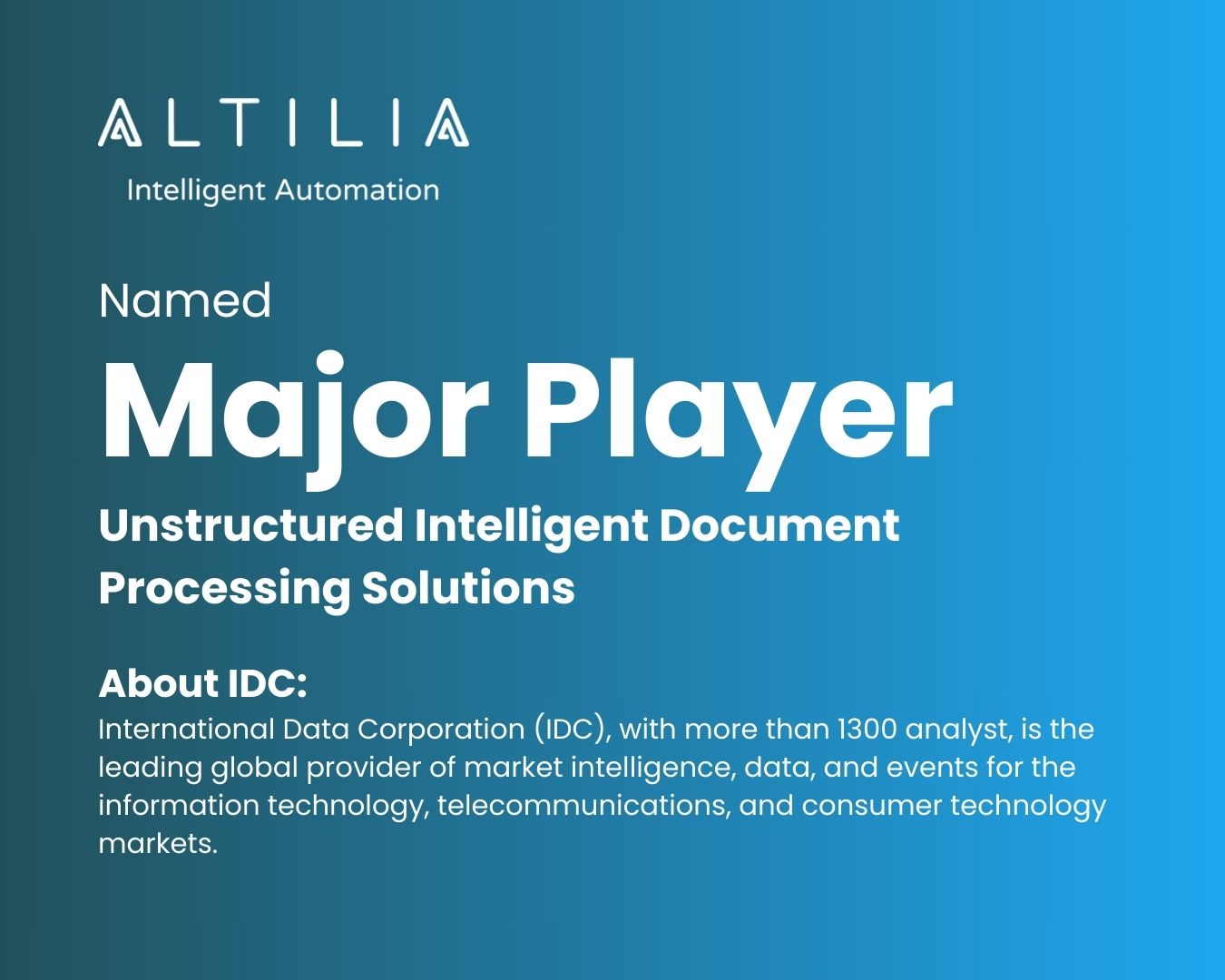Altilia is recognized as Major Player in 2023-2024 IDC MarketScape Worldwide Intelligent Document Processing Vendor Assessment
Altilia is recognized as Major Player in 2023-2024 IDC MarketScape Worldwide Intelligent Document Processing Vendor Assessment



Imagine writing an email in 20 seconds instead of 20 minutes, completing hours of research in a fraction of the time, or automatically receiving a full summary of a long meeting. These scenarios showcase the potential of AI assistants, or copilots, integrated into your workflow. With these tools, you simply tell the copilot what to do, right in the flow of your work. But is this too good to be true? What is an AI copilot? You might be familiar with copilots in the context of aviation, assisting the captain during flights. Recently, the concept of a "copilot" has gained more traction in the realm of artificial intelligence (AI). Imagine incorporating the generative AI technology from apps like ChatGPT, Gemini, or Claude into your daily workflow. That is your AI copilot. At its core, an AI copilot is an AI assistant designed to help you complete routine tasks more efficiently. Using large language models (LLMs), it facilitates natural, human-like conversations, assisting users with a wide range of tasks. Examples include the AI copilot developed by Microsoft for its Office suite. How does an AI copilot work? AI copilots are powered by fundamental components known as copilot actions. A copilot action can cover a single task or a collection of tasks specific to a particular job. These tasks might include: Updating a CRM record. Generating product descriptions using existing CRM data. Composing messages to customers. Handling various use cases. Summarizing transcripts for a live service agent. Highlighting the most relevant information from meeting notes. These tasks can be "invoked" or executed in any order, autonomously managed by the AI copilot. The ability to understand requests, devise a plan of action, and carry out the necessary tasks is what sets these systems apart. The AI copilot learns and improves with each action, becoming more capable over time. When combined, these actions enable your copilot to perform a vast array of business tasks. For instance, an AI copilot can assist a service agent in quickly resolving a customer overcharge issue or help a lawyer to spot the right strategy to use. The challenges of implementing a copilot Despite their promise, many businesses are struggling to implement and use copilots efficiently. Why is this happening? 1. The Data Dilemma At the heart of the challenge lies data quality. Many organizations find their existing data outdated, inconsistent, or inaccurate. This leads to AI assistants providing unreliable or outdated answers. For instance, an AI tool might deliver 2023 data when asked about 2024 figures, or fail to correctly identify a company's executive team. A high-profile example is McDonald's collaboration with IBM to automate ordering using AI. The project, tested in 100 restaurants, was eventually abandoned due to the inherent difficulty of Ai in understanding voice commands (therefore, the input data). This decision highlights the gap between the technology's potential and its current limitations. 2. The Costly Clean-up To address these issues, companies are embarking on extensive data clean-up efforts. This process involves validating and refining incoming data, creating records and databases free of contradictions or duplicates. While necessary, this task is proving more time-consuming and resource-intensive than anticipated. 3. Reliability and learning curve AI sometimes makes things up, and we call this "hallucinating." This happens because of how AI is built. AI learns to write by predicting what words should come next, based on what it has seen before. It doesn't really understand what it's saying - it's just making good guesses. Think of it like a very advanced autocomplete on your phone, but for whole sentences and ideas. Sometimes, this leads to mistakes or false information. Even as GenAI gets better, it will probably still make these mistakes sometimes. That's why it's important for people to double-check what AI produces to make sure it's correct and makes sense. Another hurdle is the complexity of effectively "prompting" these AI assistants. Users often struggle to provide sufficient context for their queries, leading to suboptimal responses. Even sophisticated tools like Microsoft's copilot don't inherently know which data sources to prioritize for specific questions. 4. Lack of scalability AI co-pilots are designed to act as personal productivity assistants. However, they aren't well-suited for industrial applications. In industrial settings, processes need to be carried out on a large scale, with reliable results and minimal human supervision. Co-pilots, as they currently exist, don't meet these requirements for industrial use, where efficiency and consistency at scale are crucial Streamlining AI Implementation To face these challenges, new solutions are emerging. copilots solutions like Altilia's are designed to address the core issues that afflict traditional copilots implementations: 1. Harmonization and Data Quality Improvement: Altilia’s platform excels in managing diverse, unstructured data from various sources automatically, significantly reducing the need for manual preparation and ensuring seamless data integration. The platform classifies content, extracts precise data and metadata, and maintains relevance without constant intervention, ensuring high-quality data is readily available. 2. Smart Data Organization for Smarter AI Assistants By organizing data into comprehensive knowledge graphs, Altilia makes it easier to create enriched records that AI assistants can access and utilize for pertinent, up-to-date information, thereby enhancing their accuracy and efficiency. 3. Improved reliability by Business-Specific Customization The platform trains AI models to learn domain specific knowledge, within unique business contexts. This allows AI assistants to answer company-specific questions, with superior relevance and effectiveness, ensuring that each AI assistant is tailored to meet the distinct needs of the organization. 4. Result Transparency Altilia accelerates the implementation of AI assistants in the workplace, providing a transparent platform that always allows to review answers and results, tracing back data in the context of its original source, promoting trust and understanding among users. 5. Scalability for enterprise applications Altilia’s solution manages entire business processes from beginning to end. Altilia’s Co pilot is both reliable and flexible, allowing for easy control and monitoring of results and responses generated by AI models. This approach facilitates the seamless integration of AI into large-scale operations, addressing the need for dependable automation in complex business environments. Looking Ahead It's clear that AI copilot features and capabilities will continue to expand. We're moving from manually entering data and clicking through screens to simply making requests in natural language, with copilots promptly retrieving relevant information from business meetings or internal documents While implementing AI work assistants has proven more challenging than expected, solutions addressing data quality, structure, and relevance offer a path forward. As these technologies evolve, we can anticipate more seamless integration of AI assistants, leading to the productivity gains and insights that businesses are eagerly awaiting.
Read more
In the ever-evolving landscape of digital business, data has become the new currency. Yet, not all data is created equal. While structured data has long been the cornerstone of business analytics, an ocean of unstructured data remains largely hidden. This is where Artificial Intelligence (AI) is making a difference, offering new ways to extract value from this digital goldmine. The Unstructured Data Difficulty Imagine for a moment the volume of information that flows through a modern enterprise: countless emails, social media interactions, customer service calls, images, videos, and documents. This is the realm of unstructured data, and it's growing at an astronomical rate. According to Gartner, a staggering 80% to 90% of data generated and collected by organizations is unstructured, with its volume expanding many times faster than structured data. The challenge lies not just in the volume, but in the nature of this data. Unlike structured data that neatly fits into predefined database fields, unstructured data is a mix of formats and sources. It's the difference between a meticulously organized filing cabinet and a room full of scattered papers, photos, and recordings. This lack of inherent organization has historically made unstructured data a huge challenge for traditional analytics tools. Enter Artificial Intelligence This is where AI emerges as a game-changer. Advanced machine learning algorithms and natural language processing capabilities are enabling businesses to sift through vast quantities of unstructured data, uncovering patterns, insights, and actionable information that were previously hidden from view. Altilia is pioneering this field, offering solutions that transform how businesses handle unstructured data. Altilia's platform represents a leap forward in our ability to extract meaningful information from unstructured documents. It's not just about converting text to digital format; Altilia’s IDP solution can understand context, categorize information, and even make inferences based on the content they process. Solving the Unstructured Data problem Altilia's platform combines various AI technologies to tackle complex document workflows. This innovative approach allows businesses to automate the ingestion and analysis of various document types, extracting relevant information and even flagging potential issues or inconsistencies. What sets Altilia apart is its focus on accessibility and continuous improvement. Their no-code platform democratizes AI technology, making it accessible to users without technical backgrounds. Furthermore, their “human-in-the-loop” continuous learning ensures that the system keeps improving over time, adapting to new document types and evolving business needs. The Power of IDP in Action Imagine a banking institution processing loan applications. Traditionally, this would involve manual review of numerous documents, a time-consuming and subject to errors process. With Altilia's IDP solution, the bank can automate this process, handling a wide range of document formats and integrating seamlessly with existing enterprise systems. This not only speeds up the process but also enhances accuracy and compliance. But the applications go far beyond banking. In the legal sector, Altilia's AI can filter through vast databases of case law, identifying relevant precedents. In customer service, it can analyze call transcripts and chat logs to identify common issues and measure customer sentiment. The possibilities are virtually endless. The Business Impact The impact of these capabilities on business operations and decision-making cannot be overstated. By leveraging Altilia's IDP platform, businesses can: Enhance Efficiency: Automating complex document workflows dramatically reduces manual labor and accelerates decision-making processes. Improve Accuracy: AI-powered document processing minimizes human error, ensuring more reliable data extraction and analysis. Scale Operations: Altilia's platform can handle large volumes of documents efficiently, allowing businesses to scale their operations without proportionally increasing costs. Drive Innovation: By uncovering hidden patterns and correlations in unstructured data, businesses can spark new ideas for products, services, or process improvements. The Road Ahead While the potential of AI in managing unstructured data is immense, implementation requires careful consideration. This is where Altilia's ethical AI practices come into play, ensuring that businesses can harness the power of AI responsibly and sustainably. As we stand on the brink of a new era in data analytics, one thing is clear: the ability to effectively harness unstructured data will be a key differentiator for businesses in the coming years. Altilia's IDP platform is not just a tool for efficiency; it's a gateway to a new world of business intelligence. Conclusion The organizations that can successfully navigate this new landscape - leveraging AI to turn the chaos of unstructured data into a wellspring of actionable insights - will be well-positioned to lead in their respective industries. As the volume and variety of unstructured data continue to grow, so too will the importance of advanced IDP solutions like Altilia's. The future of business intelligence is here, and it's powered by AI. With Altilia's innovative approach to IDP, businesses have a powerful ally in their quest to unlock the full potential of their unstructured data. By embracing these technologies, companies can not only keep pace with the data revolution but stay ahead of the curve, turning information into insight, and insight into action.
Read more
We are thrilled to announce our recognition as a Major Player in the IDC MarketScape for Unstructured Intelligent Document Processing (IDP) software This recognition highlights our software's ability to streamline business operations by effectively managing complex unstructured document workflows, particularly in sectors like finance and public administration. From the beginning, we have focused on enhancing organizational knowledge management with a solution that processes both structured and unstructured data, acting as a co-assistant to employees. Our Human-in-the-Loop (HITL) AI approach ensures continuous model training and transparency, providing highly accurate and reliable results. With a dedicated team of over 50 professionals, including scientists, researchers, and software engineers, we are committed to democratizing the use of AI to help enterprises automate document-intensive business processes. This acknowledgment by IDC MarketScape reaffirms our position as a leader in the ever-evolving landscape of Intelligent Document Processing technology. Our platform is designed for quick deployment and intuitive workflow design, making it suitable for organizations of all sizes and across various industry verticals looking to implement unstructured IDP. As we celebrate this recognition, we remain dedicated to shaping the future of document processing by bringing cutting-edge solutions to the forefront of the IDP market. Our goal is to offer organizations unparalleled efficiency, automation, and knowledge management capabilities. What is Unstructured IDP ? Unstructured Intelligent Document Processing (IDP) refers to a class of software technologies that leverage a combination of traditional and generative AI (GenAI), advanced analytics, and business rules to automate the classification, extraction, analysis, and validation of data from unstructured, semi-structured, and structured document formats. These technologies are designed to handle the high variability, inconsistent formats, and mixed elements (e.g., text, tables, charts) characteristic of unstructured documents, making the data within these documents actionable and integrated into business workflows. About IDC MarketScape: IDC MarketScape vendor assessment model is designed to provide an overview of the competitive fitness of ICT (information and communications technology) suppliers in a given market. The research methodology utilizes a rigorous scoring methodology based on both qualitative and quantitative criteria that results in a single graphical illustration of each vendor’s position within a given market. IDC MarketScape provides a clear framework in which the product and service offerings, capabilities and strategies, and current and future market success factors of IT and telecommunications vendors can be meaningfully compared. The framework also provides technology buyers with a 360-degree assessment of the strengths and weaknesses of current and prospective vendors.
Read more